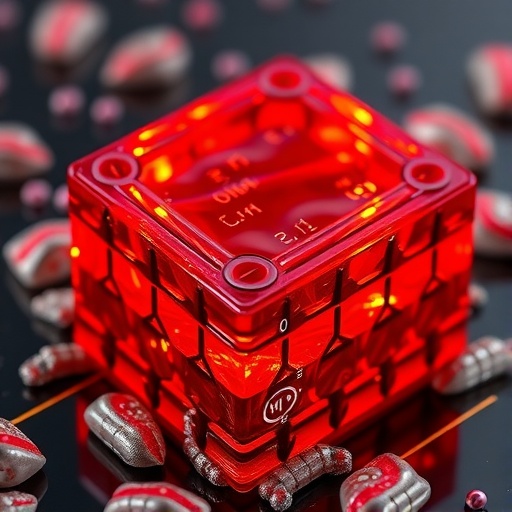In an increasingly electrified world, the demand for energy storage technologies is more critical than ever. As advancements in technology push the boundaries of energy sustainability, supercapacitors have emerged as formidable contenders in the realm of energy storage systems. A groundbreaking study conducted by researchers Kaur, Sharma, and Sharma has recently illuminated a novel approach to enhancing these devices through the use of a unique composite electrolyte. This research promises to revolutionize how we harness and store energy, configuring solid-state supercapacitors that maintain their performance even under extreme temperature conditions.
The core innovation of the study lies in the development of a solid-state supercapacitor employing a composite electrolyte based on lithium-ion (Li+) garnet and ionic liquids. This groundbreaking combination is especially important as conventional electrolytes often struggle with thermal stability, leading to reduced performance and potential safety hazards. By integrating Li+-garnet with ionic liquids, the researchers have crafted an electrolyte that not only sustains high ionic conductivity but also exhibits remarkable thermal tolerance, expanding the potential operational temperature range of supercapacitors.
One of the primary challenges faced in energy storage technologies is the trade-off between energy density and power density. While supercapacitors excel in rapid charging and discharging, they often lag behind in energy storage capacity compared to traditional batteries. The findings from Kaur and colleagues indicate that their composite electrolyte not only enhances the thermal stability of the supercapacitor but also improves its energy density. This dual improvement paves the way for applications that require both quick power delivery and substantial energy storage, making supercapacitors more viable for a variety of uses.
The researchers utilized a series of rigorous experiments to assess the performance metrics of their supercapacitor design. Employing a variety of methods, including electrochemical impedance spectroscopy and cyclic voltammetry, they managed to demonstrate the superior conductivity of their Li+-garnet-ionic liquid composite. The results were impressive, showing that the composite maintained high ionic conductivity not only at room temperature but also at elevated temperatures, far exceeding the capabilities of conventional aqueous or gel electrolytes.
In practical terms, the ability to operate in a wide temperature range means these supercapacitors could find applications in extreme environments—ranging from electric vehicles that operate in varied climates to renewable energy systems situated in remote locations. For instance, integrating these supercapacitors into the automotive sector could provide vehicles with a more efficient method of energy storage, allowing for quicker acceleration while minimizing the risks associated with overheating.
The versatility of the newly developed supercapacitors extends beyond temperature resilience. Given their improved energy density, these devices could serve critical functions in applications where space and weight are at a premium. This opens up the potential for their integration into portable electronics, aerospace applications, and even grid-scale energy storage solutions that require both high power and energy capacity. The ramifications for cleaner energy systems and electric mobility could be transformative, facilitating a faster transition to sustainable energy solutions.
Moreover, the safety characteristics of solid-state supercapacitors cannot be overstated. Unlike liquid electrolytes that carry risks of leakage and flammability, the novel composite electrolyte developed by Kaur and her team exhibits exceptional safety profiles. This safety is crucial for manufacturers and consumers looking for reliable energy solutions that do not compromise on performance or pose environmental hazards.
As lithium-based technologies dominate the energy storage landscape, the importance of ensuring the sustainability of raw materials cannot be overlooked. The study addresses this concern by utilizing a composite that minimizes dependence on rare resources while maximizing performance. This approach aligns with global sustainability goals, making it a timely contribution to the field of energy storage research.
Furthermore, the findings from this research have sparked interest across numerous platforms within the scientific community. The potential for this technology extends into diverse fields such as marine technology, robotics, and even medical devices, where compact, fast-charging energy solutions are paramount. The multi-faceted implications of the temperature-tolerant solid-state supercapacitors position them as a leading solution to the energy challenges of the future.
Continuing advancements in materials science and electrochemistry will play a pivotal role in refining this technology further. The ongoing research efforts aim not only to optimize the performance of these supercapacitors but also to investigate even more environmentally friendly materials that can provide similar or improved characteristics. The future of supercapacitor technology looks promising as researchers explore new avenues for innovation.
In conclusion, the collaborative research led by Kaur and her colleagues is a significant stride toward redefining the landscape of energy storage technologies. With the advent of temperature-tolerant solid-state supercapacitors utilizing a Li+-garnet-ionic liquid composite electrolyte, the efficiency, safety, and practicality of energy storage devices are bound to experience a paradigm shift. These developments underscore the importance of continued research in this domain, as the quest for clean, efficient energy solutions remains a paramount global endeavor.
As we venture into a future defined by electric mobility and renewable energy solutions, the advancements reflected in this study will undoubtedly leave a mark, guiding the evolution of energy storage technologies. The journey of transforming theoretical research into practical applications is a testament to the resilience and ingenuity of scientists dedicated to forging sustainable paths for future generations.
Subject of Research: Temperature-tolerant solid-state supercapacitors.
Article Title: Temperature-tolerant solid-state supercapacitors using Li+-garnet-ionic liquid composite electrolyte.
Article References:
Kaur, G., Sharma, S., Sharma, B. et al. Temperature-tolerant solid-state supercapacitors using Li+-garnet-ionic liquid composite electrolyte.
Ionics (2025). https://doi.org/10.1007/s11581-025-06758-4
Image Credits: AI Generated
DOI: https://doi.org/10.1007/s11581-025-06758-4
Keywords: Supercapacitors, Li+-garnet, Ionic liquid, Energy storage, Temperature tolerance, Solid-state, Electrolyte, Energy density.
Tags: advanced energy storage technologiesElectrification and Energy SustainabilityEnergy Density vs Power DensityExtreme Temperature PerformanceHigh Ionic Conductivity MaterialsIonic Liquid Energy StorageLi+-Garnet Composite ElectrolyteNovel Approaches in Supercapacitor ResearchRevolutionary Supercapacitor Designssafe energy storage solutionsSolid-State Supercapacitors Innovationthermal stability in supercapacitors





